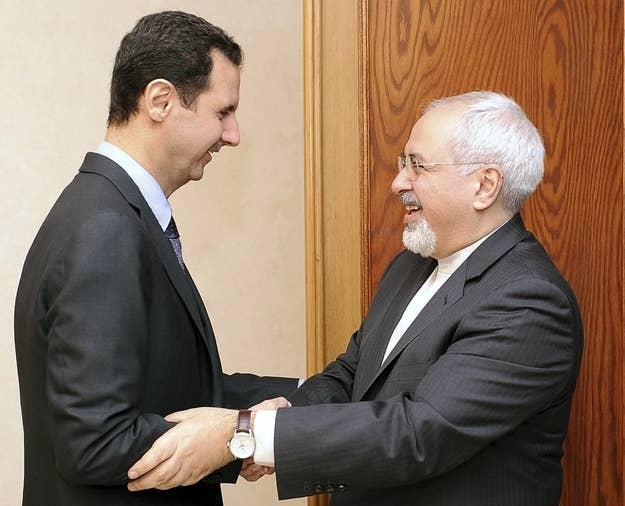
ISTANBUL — The peace talks that will bring international powers together in Switzerland this week to discuss ending Syria's civil war were jolted by a surprise announcement Sunday night: Iran has been invited to join the negotiations.
Tehran has been a crucial backer of Assad in his fight against an insurrection that will be three years old in March. It has provided him with lifelines in economic and military aid — and its soldiers have reportedly trained Assad's forces, helped to guide their strategy and even put boots on the ground.
This support has made Iran a deeply controversial player in Syria's conflict and a hated enemy in the eyes of the opposition. Its main political coalition responded quickly and angrily to news of Iran's invitation to the talks by threatening to boycott them.
Ban Ki-moon, the secretary general of the United Nations, which is hosting the talks, said on Sunday that he'd extended the invitation to Iran only after being assured that it would play "a positive and constructive role." He also suggested that Iran had agreed to the guidelines set for the talks, which call for establishing a transitional government in Syria — a concession that Iran has yet to embrace publicly.
The peace conference gets its ceremonial start on Wednesday in the Swiss city of Montreux, and the open-ended negotiations begin on Friday in Geneva. Opponents of Iranian involvement say it would only undermine the talks. The opposition could follow through with its boycott threat — and even if it does attend, Iran's presence could make it even more difficult to sell any potential agreements to the armed opposition inside Syria, much of which is already suspicious of the conference. Some moderate rebel groups support the negotiations, but others, such as the powerful Islamic Front, have painted participation in them as treason.
The invitation also raised the question of what, if anything, Iran could do to help.
Iran has long pushed the idea that it can play an important role in attempts to bring the conflict — which has killed more than 130,000 people, many of them civilians, and displaced millions — to a negotiated end. In an interview with BuzzFeed earlier this month, one Iranian official suggested a key reason the country could make a difference in negotiations was its unique influence with Assad.
The official said that Iran had been "quite instrumental and helpful in persuading Syria to accept the chemical weapons deal" implemented this fall, in which Assad agreed to give up his stockpiles of the weapons to avoid a U.S. air strike. Iran, the official said, could play a similar role in Geneva. "They should invite the countries that have influence inside Syria and excluding Iran will not be helpful," the official said, requesting anonymity because of the subject's sensitivity.
"There are two realities inside Syria and we cannot dismiss any of them: the government and the opposition," the official added. "The main matter for Iran is finding a political solution, based on the Syrian people's will, and stopping the bloodshed as soon as possible."
Yet Iran has so far refused preconditions to talks or allowed that they must result in Assad's departure — something seen as non-negotiable to the opposition and vital to any serious push for peace. The Iranian official stressed the importance of the presidential elections scheduled for later this year in Syria, in which Assad has repeatedly said he will likely run. ""I see no reason why I shouldn't stand," Assad said in an interview with Agence France-Presse published on Monday.
The response to the invite from U.S. officials suggested that it had taken them by surprise, though the two countries have been improving ties via negotiations over Iran's nuclear enrichment program. State Department spokeswoman Jen Psaki responded to the news on Sunday by noting that Iran's participation would require it to accept the guidelines for the talks, which hold that they must lead to a transition in Syria, though not necessarily a departure for Assad. "This is something Iran has never done publicly and something we have long made clear is required," Psaki said in a statement.
Jeremy Shapiro, a visiting fellow at the Brookings Institution and former U.S. State Department official, said that Iran may be more eager to end the conflict in Syria than it appears — and also potentially willing to see Assad leave office. "The fact is they are suffering in Syria. They're wasting a lot of strength," Shapiro said. "They have some core interests they want to protect [in Syria] but they can protect them without being married to Assad. I think you could argue that in the long-term he puts them at risk."
Iran may be more interested in seeing the Syrian regime retain control in Syria than keeping Assad on as president, some analysts say. "My impression is that the Iranians know that Assad is a lost cause," said Firas Abi Ali, the head of Middle East and North Africa forecasting at IHS Country Risk, a research firm in London. "However, they see no alternative but to back him in the hope of making a settlement that excludes him but preserves the regime."
Abi Ali added that Iran might have a say in Geneva whether it attends the conference or not: "Iran can spoil any agreement that is reached in Geneva that it doesn't approve of. At the same time, there can be no political settlement without Iran."
